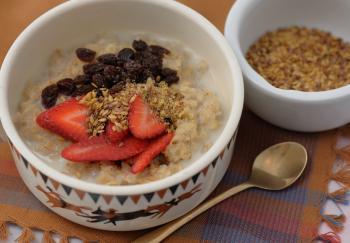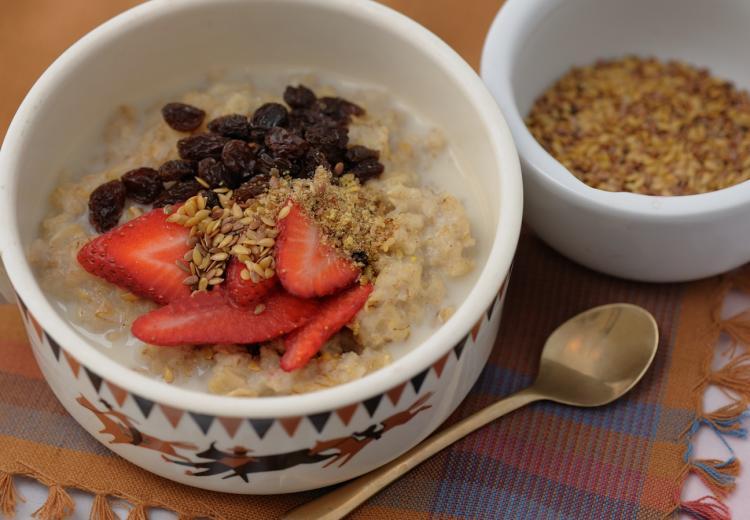Flaxseed is a true wonder food. It is typically used to produce linseed oil and manufacture linen, however it has now been found to be incredibly nutrient dense.
Flaxseed is very low in carbohydrates, making it ideal for people who limit their intake of starches and sugars, its combination of healthy fat and high fiber content make it a great food for weight loss and weight maintenance. Many dieters have found that flaxseed has been a key to keeping them feeling satisfied.
Available at any health food and specialty store, it is highly recommended that these seeds should be bought whole and ground at home with a simple coffee or spice-grinding machine. (Flaxseed needs to be ground to make the nutrients available; otherwise they will just “pass through”).
Ground flaxseed may be kept for many months in the refrigerator or freezer. Whole flaxseed keeps for several years in clean, dry storage at below zero F to 80 F.
“Though not readily available at all places, this seed has excellent benefits such as being high in fiber and omega-3 fatty acids and is recommended by us to all our patients,” says Kusuma, Dietician at Fortis Hospital.
Flaxseed is high in most of the B vitamins, magnesium, and manganese, but this little seed is just getting started. There are three additional nutrient groups which flaxseed has in abundance, and each has many benefits.
High Fiber Content:
Dietary fiber in flaxseed adds bulk to waste products in the gut and increases movement in the gastrointestinal system. The fiber content in flaxseeds has been shown to help lower cholesterol, stabilize blood sugar levels, and relieve constipation.
Flaxseed is Rich in Omega-3 Fatty Acids:
Omega-3 fatty acids are a key force against inflammation in our bodies. Evidence shows that inflammation plays a part in many chronic diseases including heart disease, arthritis, asthma, diabetes, and even some cancers. Inflammation in the body may be enhanced by having too little omega-3 fatty acid intake (also found in fish, and walnuts) especially in relation to omega-6 fatty acid intake (in oils such as soy and corn oil). In the quest to equalize the ratio of these two kinds of oils, flaxseed can be a real help. The omega-3 alpha linolenic acid, ALA, in flaxseed is an Essential Fatty Acid for humans which is used in the body’s neural tissues, in the retina of the eye, and in the cell walls of brain.
Phytochemicals
Flaxseed is high in phytochemicals, including many antioxidants. It is perhaps our best source of lignans, which convert in our intestines to substances that tend to balance female hormones. There is evidence that lignans may promote fertility, reduce pre-menopausal symptoms, and possibly help prevent breast cancer. In addition, lignans help prevent Type 2 diabetes.
Tips for Using Flaxseed
A daily dose of ground flaxseed is about ¼ cup, 35 grams, or 3 heaping tablespoons, depending on fineness of grind.
Drink plenty of water. There is so much soluble fiber in flax that it is important to drink plenty of water when eating flax products, otherwise one may end up becoming constipated instead of the other way around.
Remember to start slowly if you aren’t used to a high fiber diet. Since flax has such a high fiber content, it is recommended to start intake with a small amount and increase slowly, otherwise cramping or a “laxative effect” can result. People with irritable bowel syndrome may have an especially strong reaction to it, and should be extra careful.
Serving Suggestions:
Flax is often used as an egg substitute in baked goods for people who can’t or choose not to eat eggs. This is because of the soluble fiber, which adds structure to the food. One tablespoon of ground flaxseed and three tablespoons of water may serve as a replacement for one egg in baking by binding the other ingredients together.
Ground flaxseed can also be mixed in with oatmeal, yogurt, or any other food item where a nutty flavor is appropriate.
Add a few tablespoons to any recipe. Mix it into pancake or muffin batter, or other baked goods.
Do try out this wonder food, using it in a variety of innovative new ways and enjoy the numerous health benefits this nutritionally packed seed has to offer.
Flaxseed is very low in carbohydrates, making it ideal for people who limit their intake of starches and sugars, its combination of healthy fat and high fiber content make it a great food for weight loss and weight maintenance. Many dieters have found that flaxseed has been a key to keeping them feeling satisfied.
Available at any health food and specialty store, it is highly recommended that these seeds should be bought whole and ground at home with a simple coffee or spice-grinding machine. (Flaxseed needs to be ground to make the nutrients available; otherwise they will just “pass through”).
Ground flaxseed may be kept for many months in the refrigerator or freezer. Whole flaxseed keeps for several years in clean, dry storage at below zero F to 80 F.
“Though not readily available at all places, this seed has excellent benefits such as being high in fiber and omega-3 fatty acids and is recommended by us to all our patients,” says Kusuma, Dietician at Fortis Hospital.
Flaxseed is high in most of the B vitamins, magnesium, and manganese, but this little seed is just getting started. There are three additional nutrient groups which flaxseed has in abundance, and each has many benefits.
High Fiber Content:
Dietary fiber in flaxseed adds bulk to waste products in the gut and increases movement in the gastrointestinal system. The fiber content in flaxseeds has been shown to help lower cholesterol, stabilize blood sugar levels, and relieve constipation.
Flaxseed is Rich in Omega-3 Fatty Acids:
Omega-3 fatty acids are a key force against inflammation in our bodies. Evidence shows that inflammation plays a part in many chronic diseases including heart disease, arthritis, asthma, diabetes, and even some cancers. Inflammation in the body may be enhanced by having too little omega-3 fatty acid intake (also found in fish, and walnuts) especially in relation to omega-6 fatty acid intake (in oils such as soy and corn oil). In the quest to equalize the ratio of these two kinds of oils, flaxseed can be a real help. The omega-3 alpha linolenic acid, ALA, in flaxseed is an Essential Fatty Acid for humans which is used in the body’s neural tissues, in the retina of the eye, and in the cell walls of brain.
Phytochemicals
Flaxseed is high in phytochemicals, including many antioxidants. It is perhaps our best source of lignans, which convert in our intestines to substances that tend to balance female hormones. There is evidence that lignans may promote fertility, reduce pre-menopausal symptoms, and possibly help prevent breast cancer. In addition, lignans help prevent Type 2 diabetes.
Tips for Using Flaxseed
A daily dose of ground flaxseed is about ¼ cup, 35 grams, or 3 heaping tablespoons, depending on fineness of grind.
Drink plenty of water. There is so much soluble fiber in flax that it is important to drink plenty of water when eating flax products, otherwise one may end up becoming constipated instead of the other way around.
Remember to start slowly if you aren’t used to a high fiber diet. Since flax has such a high fiber content, it is recommended to start intake with a small amount and increase slowly, otherwise cramping or a “laxative effect” can result. People with irritable bowel syndrome may have an especially strong reaction to it, and should be extra careful.
Serving Suggestions:
Flax is often used as an egg substitute in baked goods for people who can’t or choose not to eat eggs. This is because of the soluble fiber, which adds structure to the food. One tablespoon of ground flaxseed and three tablespoons of water may serve as a replacement for one egg in baking by binding the other ingredients together.
Ground flaxseed can also be mixed in with oatmeal, yogurt, or any other food item where a nutty flavor is appropriate.
Add a few tablespoons to any recipe. Mix it into pancake or muffin batter, or other baked goods.
Do try out this wonder food, using it in a variety of innovative new ways and enjoy the numerous health benefits this nutritionally packed seed has to offer.







_medium.jpg&w=1200&q=75)